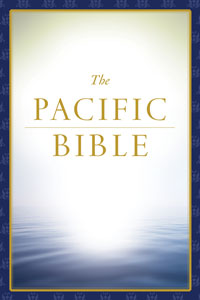 As an avid reader of the Bible, I looked forward to reviewing The Pacific Bible. Privy to the fact that almost four hundred verses—reiterating extreme human habits unacceptable in today’s society—have been removed, I reminded myself to read with an open mind.
As an avid reader of the Bible, I looked forward to reviewing The Pacific Bible. Privy to the fact that almost four hundred verses—reiterating extreme human habits unacceptable in today’s society—have been removed, I reminded myself to read with an open mind.
After reflecting on the fully retained first Chapter of Genesis, with its promulgation of spiritual persons given the dominion to care for the earth, I moved through the second and into the third chapter and smiled. I realized the verse depicting a punishing God that doomed woman to painful childbirth was archived—removed. I could relate. I had mentally removed this false view of God from my own mind almost thirty years ago. I took a strong mental stand with a God who already made and delivered everything, “and behold it was very good,” and the births of my children were natural, quick, and comfortable enough.
I figure, Scripture must be read with an ever evolving thought process otherwise interpretations become inane. Therefore, while reading The Pacific Bible, I didn’t compare it to other Bibles as if one or the other is wrong or right. I was definitely glad to see Judges 19:25 archived. This verse and its surrounding cohorts were horrible illustrations to make a point to honor angel messengers.
Admittedly, the decisions as to what verses to archive from the Bible would be tough. However, as a Bible student and church attendee, I’ve noticed readers indirectly archive by means of simply ignoring the verses from deeper study. For example, I rarely hear references made to verses offering advice to slave holders and slaves. Many of these references were literally omitted from The Pacific Bible. Because I’m of a mindset to view my fleshly body as the servant of divine Mind, the verses not archived concerning slavery do not bother me.
Granted, children trained in the Bible receive an educational upper hand since the stories in the Bible are so widely read and known in the world. However, the world has advanced somewhat away from detrimental past behavior. A majority of references to negative behavior that could barb the child’s mind have been removed from The Pacific Bible.
Although I could see why Proverbs 29:15 was removed from The Pacific Bible, reading, “The rod of correction gives wisdom, but a child left to himself causes shame to his mother,” I beg to differ. This verse is not an excuse for abuse. As a parent and former foster parent, I am fully aware of the mistake of physical discipline however to assume we human beings have reached a spiritual attitude or altitude as to remove physical discipline measures altogether is delusional. Moreover, I feel Proverbs 29:19, “A servant can’t be corrected by words. Though he understands, yet he will not respond,” should have also been retained. These verses require further study and understanding. Physical discipline (such as spanking or grounding), counseling, lecturing, psychobabble are a part of society today and still need thoughtful progress.
To be expected, more verses were archived from the Old Testament than from the New Testament. After realizing the entire verse I Corinthians 6:9 is removed, I concluded that instead of removing the entire verse, I would have preserved the first sentence, “Or don’t you know that the unrighteous will not inherit the Kingdom of God?” Agreed, it is futile to categorize what is “unrighteous” on a human scale because it only brings division among people, however it is a truism that unrighteous thoughts do not experience the presence of heaven on earth.
There was a general flowing feel while reading The Pacific Bible. I will and have recommended it especially to those who have put the Bible aside as out of touch with reality. Authors, revisionists, and readers can continue responding to the law of progress which is demanding a clearer correct vision of God and ourself and the world.
